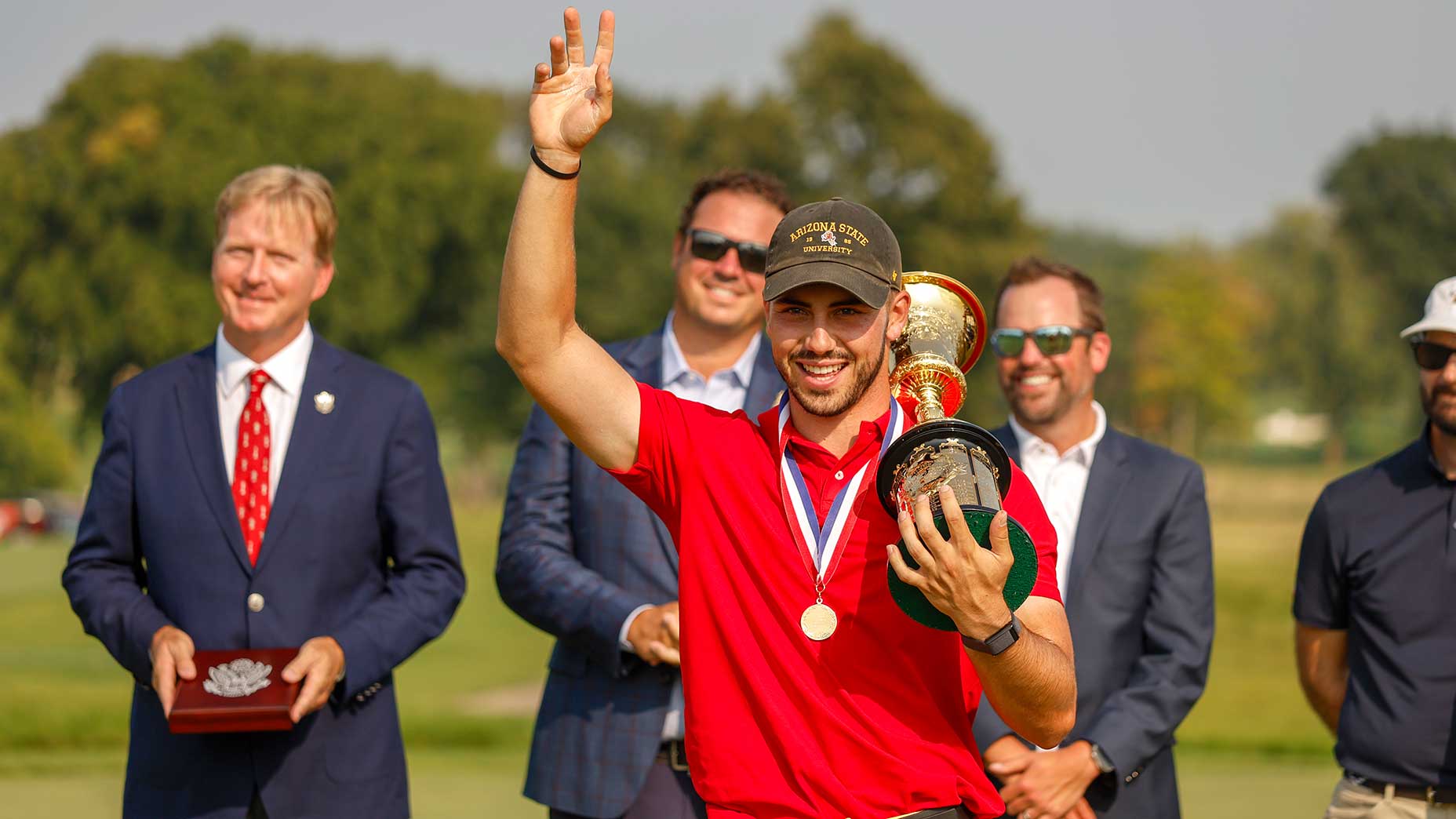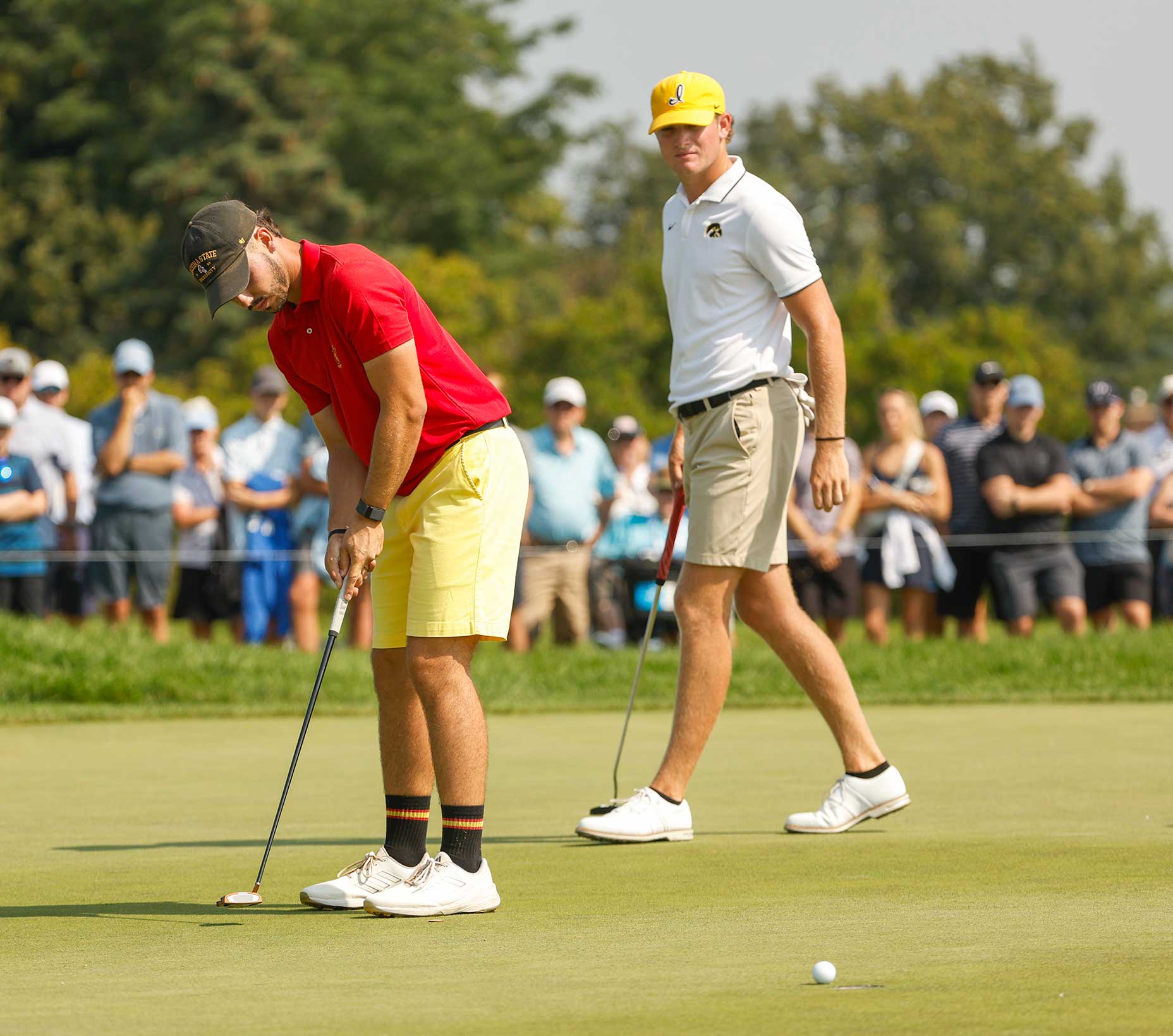
Jose Luis Ballester hoists The Havemeyer Trophy after winning the 2024 U.S. Amateur on Sunday at Hazeltine.
USGA/Chris Keane
CHASKA, Minn. — The legend of Jose Luis Ballester slowly spread across the property on Thursday afternoon.
Playing a Round of 16 match against Christian Brand at Hazeltine National Golf Club, Ballester and Brand reached the uphill, into-the-wind 624-yard par-5 3rd hole. Ballester’s tee ball found the right side of the fairway, and from about 315 yards out he reached into his bag and grabbed… driver.
The 100 or so fans walking along exchanged puzzled looks. Driver? But Ballester took a mighty swing and hit a low, piercing cut that landed in front of the green and rolled out to pin high, 15 feet away. He showed no expression, but those around him were flabbergasted. Fans walked around looking to confirm yardages on sprinkler heads. A few who brought rangefinders measured the distance themselves.
Even three holes later, on the 6th fairway, a mid-50s man was still trying to unpack it all. He walked aimlessly in the rough while talking on the phone.
“It was driver off the damn deck, Steve,” he said. “You should have heard the sound of it. Not the sight of it, but the sound of it.”
So who is this new U.S. Amateur champion? Despite being ranked 10th in the world, the Spaniard’s quiet, low-key demeanor had him flying under the radar all week. But after Sunday — and his 2-up victory over Noah Kent in the U.S. Amateur final — Ballester’s no longer off the radar.
Not even close.
In order to beat Kent in the 36-hole final, Ballester had to also overpower the crowds. It was already American vs. Spaniard on U.S. soil, and Kent was even somewhat local, given that he goes to school just a 4 1/2-hours drive south at the University of Iowa. He had a massive amount of support in his corner, and even though it never got overly aggressive, it was still heavily in the rising sophomore’s favor.
Luckily, Ballester had perhaps the best person on earth to properly educate him about this particular situation: Sergio Garcia. They are from the same area in Spain and Garcia’s father, Victor Garcia, has coached Ballester the past seven years. Ballester and Sergio have grown close and even played rounds together, and it was on this same course Garcia had to deal with rowdy American crowds for the 2016 Ryder Cup, when he halved his Sunday singles match with fan favorite Phil Mickelson.
Garcia and Ballester talked throughout the week and again on Saturday night.
“He told me just stay patient in your game,” said Ballester, a rising senior at Arizona State, “and the best way to demonstrate to the other fans is with your game.”

USGA/Chris Keane
Ping-Pong also helps. He’s played it every night this week, and although he seems stone-cold inside the ropes, Ballester joked that Ping-Pong probably helps him release aggression — “I get really, really pissed at Ping-Pong,” he said — so he doesn’t have to on the course. He played again on Saturday night, although he had trouble sleeping. Yes, he was already in the 2025 Masters and U.S. Open by simply getting to the final, but how many people can say they’ve won this trophy? That keeps a man up at night.
“When you come to this final and to this kind of opportunities, you want to write your name in history,” Ballester said.
As the son of former Olympians who competed in three different Olympic Games, Ballester has good genes. His father, Jose Luis Ballester, was a swimmer, and his mother, Sonia Barrio, won gold in field hockey at the 1992 Summer Games. But he’s had his own success on the golf course. In three years at ASU he’s earned honorable mention All-America every season. In 2023 he qualified for the 2023 Open Championship at Royal Liverpool and missed the cut by two strokes. He hits it a mile, but his short game is no joke, either.
Last year he missed the cut at the U.S. Amateur, his first USGA event. Now? He was in the final and with a chance to be the first Spaniard ever to win The Havemeyer Trophy. And on Sunday morning, Ballester wasted little time getting a head start. He birdied two of the first four and took an early 2-up lead, and even on the holes Ballester wasn’t making birdie, Kent struggled off the tee. Ballester won 16 and 17 with pars and was 4 up after 18.
During the break between rounds, Kent, a rising Iowa sophomore, said he took a long shower and spent some time on the phone, talking to mentor John Harris, sports psychologist Brett McCabe and coach Claude Harmon III. Something worked, because Kent gave the gallery a jolt when he chipped in for birdie to win the first hole of the second 18.
“You don’t want to be 4 down going into an 18-hole match,” Kent said, “but it’s been done before, and I kept telling myself that.”
They traded blows in the afternoon and Ballester’s lead shrunk to 2 up after Kent won the 31st and 32nd holes. On the 33rd hole (the par-4 16th) Ballester hit his drive right and was left with tree trouble and a terrible lie. He chunked it into the marsh in front of the green. Watching nearby was Ballester’s best friend Navid Mousavi, who anxiously bit his nails and exhaled. Besides Ballester’s two Arizona State coaches who made the trip, Mousavi might have been the only pro-Ballester fan who actually knew him who was on-site.
Mousavi grew up with Ballester and plays on the William Carey University men’s team in Mississippi. He came up for Saturday’s semifinals and followed every shot the last two days.
“He’s a great kid with great values,” said Mousavi, who was wearing a white version of the red Spain national team shirt Ballester wore Sunday. “He’s always been a long hitter, but around 15 or 16 he got huge, taller and stronger. He’s always been strong at the gym, and he just hits it forever.”
Mousavi said Ballester is serious inside the ropes but can be goofy, too, like when they were rooming together for a tournament when they were 14 and Ballester randomly shaved a stripe of hair off his calf and took some from his eyebrow, too. (“His mom was not happy,” Mousavi said.)
His college coach, Matt Thurmond, said Ballester isn’t the Sun Devils’ vocal leader and is prone to drifting off or taking pre-round naps, but as soon as a round starts he has no problem locking in.
And that 16th hole where Ballester got in trouble — the 34th of the day — might have been Thurmond’s favorite moment from Sunday. Ballester finally found the ball after looking for a couple of minutes, muscled it out and scared the hole with a par try from 40-feet away. Kent had an easy two-putt par to win and cut Ballester’s lead to 1 up, but Thurmond said it was an example of Ballester’s determination. He just assumed he was going to take a drop and hope to chip in.
“To actually have a putt to maybe try to hole,” Thurmond said, “I felt like that in a way was a little victory and it showed his fight.”
They pushed with pars on the par-3 17th, so Ballester and Kent went to the 36th hole with Ballester 1 up. Kent drove it into a fairway bunker, missed the green and failed to chip in for birdie, and the hole was conceded after Ballester nestled his birdie putt to tap-in range.
He had won. And then he started to cry.
“I started thinking a lot about my family and friends, especially my mom and my dad,” Ballester said. “It’s been a hard summer for me. I wasn’t feeling really good and like some personal issues. My grandma isn’t feeling very good. She’s pretty sick. It was a hard summer back in Spain, so I feel like all those emotions kind of came out thinking about my family and my friends back in Spain.”
Thurmond couldn’t hold back the tears either.
“Just to see him in this moment, a moment that will last forever that’s life changing for him,” Thurmond said. “To get to this moment, to be this good, on this stage, you have to overcome a lot, and he has.”
It was a day to celebrate. Not only a U.S. Amateur trophy, but Ballester’s birthday. He turned 21 on Sunday.
“It can’t get much better than this,” he said.

